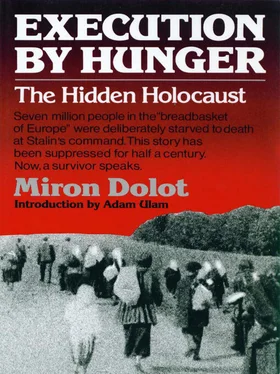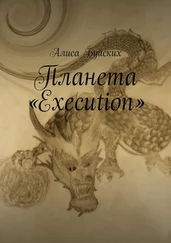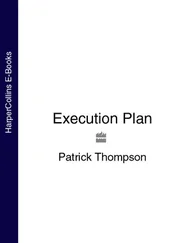The silence was interrupted by the chairman of the village soviet as he called for other speakers. One after another, all the officials on the platform spoke. Even a few farmers took the stand, most of them well-known members of the Komnezam and active supporters of the Communist regime in our village.
But we did not listen any more. We clapped our hands after every speech, though our minds were elsewhere. The officials had made it clear that the villagers had to join the collective farm or be banished to Siberia or other cold Russian regions. They talked about destroying kurkuls as if they were speaking of destroying some agricultural vermin or animal pest. We too were to participate in destroying them, they told us. We were not instructed how, but we were given to understand that any way or means would be justified.
Although I was still a young boy at that time, many questions plagued me after those speeches. Who were those kurkuls? Who could be labeled a kurkul? I asked myself: is my neighbor a kurkul also? And what about my family and relatives? Are we all kurkuls?
Someone shouted, “What does kurkul mean?”
The Party Commissar answered: “Kurkuls are exploiters of the poor; they are the remnants of the old regime, and they must be liquidated as such. Also those who oppose the policy of the Party and Government will be considered kurkuls. They will also be liquidated.” This explanation suggested that anyone could be labeled a kurkul.
As the winter sun set behind the ruins of the church, Comrade Zeitlin proposed that the villagers send a telegram to the Central Committee of the Communist Party and to the Soviet government, expressing thanks for the prosperous and happy life of the Soviet villagers, and particularly for the introduction of the collective farms. As at the Hundred meeting, there was only one question: “Who is against it?” Since no one dared object, the telegram was approved by acclamation.
When the applause ended, the chairman of the meeting read the inevitable resolution. It stated that the farmers were happy to join the collective farms, and that they had promised the Party and government to complete the collectivization of the village by the first of May. Again, since not a single voice was raised against it, the resolution was adopted, and the meeting adjourned.
THE CHAIRMAN of the First Hundred’s Bread Procurement Commission was Ivan Khizhniak. He had once been our neighbor. Comrade Khizhniak was about forty, short and heavy, and semiliterate. His face was lined with deep wrinkles, and his thick dirty-blond hair and cold, dull-green eyes half-covered with wrinkled eyelids and bristly eyelashes gave him a porcine look.
This was the man who was in charge of the Bread Procurement Commission in our Hundred. His physical ugliness seemed to shape his mind and his morality. He was cruel, rough, and embittered. His manner of speaking was sarcastic and vulgar, or limited to pat, official phrases. Sometimes he would try to speak in an urbane manner which he had picked up somewhere during his absence from our village, but even then he would insert the foulest profanity into his language.
Comrade Khizhniak was the only known Communist in our village when the October Revolution began. During the Revolution, as chairman of the Committee of Poor Peasants (the Komnezam), he was one of the most eager and active organizers of the local revolutionary government. After the Revolution, he remained a loyal executor of the Communist policy in the village. Indeed, he became a powerful village politician, and as such, he caused the death of many prominent villagers.
Shortly after the Revolution, when one of the frequent Communist policy shifts had gone into effect, he disappeared from the village, leaving a tangle of loose ends behind. No one knew where he had gone or what he was doing. The villagers began to forget about him, but when the collectivization started, Khizhniak reappeared.
In organizing the Hundred’s Bread Procurement Commission, Comrade Zeitlin and his Party and government assistants seemed to have drawn mainly on the degenerate elements of our village for their workers. Khizhniak’s commission serves as a vivid example of this. True, there were honest and industrious villagers whom we knew and respected among the members of the commission, but its core was composed of individuals with sadistic impulses. Besides Comrade Khizhniak, one of the other members that I knew was the vicious Vasil Khomenko, a man whose sadism made him infamous in our village.
The other commission members were not so notorious as Khizhniak or Khomenko; nevertheless, they still belonged to that troublesome group that made the villagers’ lives insecure and miserable.
Ivan Bondar, or “Comrade Judas,” was another member. He came to our Hundred a few days after the church was destroyed. As our Hundred happened to bear the number “One,” the village officials wanted to make it a model for the other Hundreds. Therefore, they staffed it with the most trusted individuals. Comrade Judas soon found perfect accord with Comrades Khizhniak and Khomenko.
Almost absolute power was given to these Party and government functionaries. Their abilities were measured by the amount of foodstuff they could extract from the farmers and by the number of farmers they could collectivize in the shortest amount of time. They used whatever methods were effective in accomplishing their task. The Communist dictums that the end justifies the means, and that the winner is always right, were the credos of the day.
There is a Ukrainian proverb that says that a master is not as cruel as a servant would be in his place. Comrade Khizhniak and his lieutenants, all farmers themselves, promoted to official positions, became drunk with power; they used their officialdom to exert a ruthlessness and cruelty unheard of in our village. There seemed no limitation to their arbitrariness and vanity. The activity of the commission was carefully planned and coordinated. Comrade Khizhniak, the propagandist, and a few other members of the commission presided at the court in the Hundred’s headquarters. They would summon those farmers who had shown themselves to be stubborn or suspicious and would “work” on them individually. Comrades Khomenko and Judas, with the rest of the Hundred’s functionaries, worked through the Tens and Fives, also individually. However, they concentrated their efforts on conducting meetings of members of those units. We had to attend one meeting or another practically every day, Sundays included. The Sunday meetings would usually start early in the morning and last all day long.
The commission functionaries of our Hundred, as well as those of all the others, used strictly prescribed methods in dealing with us. One method, unsophisticated but effective, was “path treading,” as the functionaries termed it. A farmer would be called to his Hundred and the usual interrogation would follow. Why had he not joined the collective farm? This same question would be asked repeatedly. The Hundred’s officials would tell him that only an “enemy of the people” opposed the Communist policy of collectivization. Since there was no place for an “enemy of the people” in the Soviet Union, there would be no choice for him: he either had to join the collective farm, or be eliminated. Finally, they would give him a pencil to sign the application and thus avoid all trouble. Some did sign, but the majority refused, using various excuses and pretexts.
At this point, the “path-treading” method would be used. The official would tell the farmer to take some message to the neighboring Hundred, say to the Second Hundred. Since no one could refuse to accept an official assignment, the man would take the message, whatever it was, and start his trip through the village. When he had arrived at the Hundred to which he had been assigned, he found that they had been expecting him there. Immediately, the farmer was subjected to another interrogation. Again he had to explain why he was not yet a member of the collective farm; again he would be told to join immediately. If he still refused to join, he was sent to the next Hundred, and from there to the next, and so on. After the last Hundred, he would be sent to the village soviet office where Comrade Zeitlin was in charge. Here again he went through the same long, complicated interrogation.
Читать дальше












